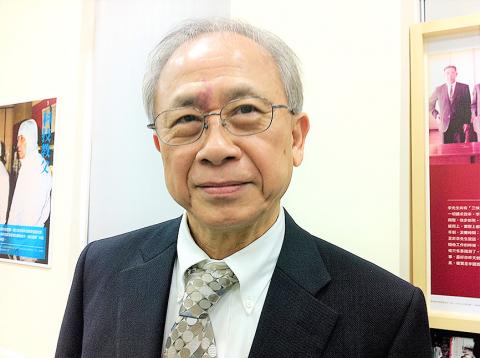Chung-Hua Institution for Economic Research (CIER, 中華經濟研究院) yesterday announced that its chairman, Hu Sheng-cheng (胡勝正), had died of pulmonary calcification on Tuesday evening at National Taiwan University Hospital.
The 77-year-old widely respected academic was survived by his wife and two sons.
Hu had been frail and was recently hospitalized for flu symptoms, his secretary said by telephone.

Photo: Wang Meng-lun, Taipei Times
The Taipei-based think tank is setting up a makeshift memorial hall for people to pay tribute to Hu from today, she said.
With a doctoral degree in economics from the University of Rochester in the US, Hu took the helm of CIER in 2016 at the invitation of President Tsai Ing-wen (蔡英文). He concurrently served as a standing board director at the central bank.
Tsai said Hu’s death was a great loss to the nation.
A native of Yilan, Hu taught at Purdue University for 28 years before returning home to teach at National Taiwan University in 1996. In 2000 he was elected a member of Academia Sinica, the nation’s top research institute.
Hu joined the government in 2001, first serving as minister without portfolio and later heading the Council for Economic Planning and Development (renamed the National Development Council, NDC) and the Financial Supervisory Commission.
Hu had called on the local industry to transform and upgrade, replacing the “Made in Taiwan” model with the “Served by Taiwan” orientation, the NDC said in a statement.
Hu also pushed for equitable distribution of the nation’s wealth and resources, as well as advocated the need for balanced development between rural and urban areas, the council said.
The central bank described Hu as a gentle man, who remained positive even as his health deteriorated after a serious gastrointestinal ailment in 2016.
He passed out during a meeting at the Presidential Office in April last year and was rushed to Mackay Memorial Hospital.
Academics across the political spectrum mourned his death, expressing their admiration for his academic prowess.
Hu gave up a comfortable life in the US and demonstrated great courage by joining the government in a time of tumult, Taiwan Institute of Economic Research (台經院) president Lin Chien-fu (林建甫) said.
As the head of CIER, Hu said the institute would strive for better quality and forward-looking research to help the government, industry and society.
He showed particular concern about the nation’s rapidly aging population, which he said merited serious attention from policymakers and the public so that they could better grasp the issue and make adjustments.

Intel Corp chief executive officer Lip-Bu Tan (陳立武) is expected to meet with Taiwanese suppliers next month in conjunction with the opening of the Computex Taipei trade show, supply chain sources said on Monday. The visit, the first for Tan to Taiwan since assuming his new post last month, would be aimed at enhancing Intel’s ties with suppliers in Taiwan as he attempts to help turn around the struggling US chipmaker, the sources said. Tan is to hold a banquet to celebrate Intel’s 40-year presence in Taiwan before Computex opens on May 20 and invite dozens of Taiwanese suppliers to exchange views

Application-specific integrated circuit designer Faraday Technology Corp (智原) yesterday said that although revenue this quarter would decline 30 percent from last quarter, it retained its full-year forecast of revenue growth of 100 percent. The company attributed the quarterly drop to a slowdown in customers’ production of chips using Faraday’s advanced packaging technology. The company is still confident about its revenue growth this year, given its strong “design-win” — or the projects it won to help customers design their chips, Faraday president Steve Wang (王國雍) told an online earnings conference. “The design-win this year is better than we expected. We believe we will win

Chizuko Kimura has become the first female sushi chef in the world to win a Michelin star, fulfilling a promise she made to her dying husband to continue his legacy. The 54-year-old Japanese chef regained the Michelin star her late husband, Shunei Kimura, won three years ago for their Sushi Shunei restaurant in Paris. For Shunei Kimura, the star was a dream come true. However, the joy was short-lived. He died from cancer just three months later in June 2022. He was 65. The following year, the restaurant in the heart of Montmartre lost its star rating. Chizuko Kimura insisted that the new star is still down

While China’s leaders use their economic and political might to fight US President Donald Trump’s trade war “to the end,” its army of social media soldiers are embarking on a more humorous campaign online. Trump’s tariff blitz has seen Washington and Beijing impose eye-watering duties on imports from the other, fanning a standoff between the economic superpowers that has sparked global recession fears and sent markets into a tailspin. Trump says his policy is a response to years of being “ripped off” by other countries and aims to bring manufacturing to the US, forcing companies to employ US workers. However, China’s online warriors